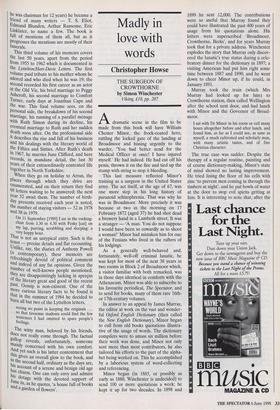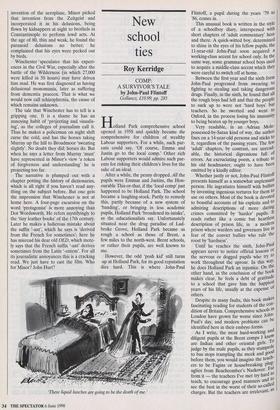Madly in love with words
Christopher Howse
THE SURGEON OF CROWTHORNE by Simon Winchester Viking, £10, pp. 207 Adramatic scene in the film to be made from this book will have William Chester Minor, the frock-coated hero, rattling the locked gate of the landing at Broadmoor and hissing urgently to the warder, 'You had better send for the Medical Officer at once! I have injured myself.' He had indeed. He had cut off his penis, thrown it on the fire and tied up the stump with string to stop it bleeding.
This last measure reflected Minor's training as a surgeon in the United States army. The act itself, at the age of 67, was one more step in his long history of paranoid schizophrenia. That was why he was in Broadmoor. More precisely it was because at two in the morning on 17 February 1872 (aged 37) he had shot dead a brewery hand in a Lambeth street. It was a stranger — 'A man. You do not suppose I would have been so cowardly as to shoot a woman!' Minor had mistaken him for one of the Fenians who lived in the rafters of his lodgings.
As a generally well-behaved and, fortunately, well-off criminal lunatic, he was kept for most of the next 38 years in two rooms in Block 2 of Broadmoor which, a visitor familiar with both remarked, was in those days identical in comforts with the Athenaeum. Minor was able to subscribe to his favourite periodical, The Spectator, and to send for books, many of them rare 16th- or 17th-century volumes.
In answer to an appeal by James Murray, the editor at work on the vast and wonder- ful Oxford English Dictionary (then called the New English Dictionary), Minor began to cull from old books quotations illustra- tive of the usage of words. The dictionary compilers were to amass six million before their work was done, and Minor not only sent more than most contributors, he also tailored his efforts to the part of the alpha- bet being worked on. This he accomplished by a laborious system of word-collecting and referencing.
Minor began (in 1885, or possibly as early as 1880, Winchester is undecided) to send 100 or more quotations a week; he kept it up for two decades. In 1898 and 1899 he sent 12,000. The contributions were so useful that Murray found they could have illustrated the past 400 years of usage from his quotations alone. His letters were superscribed 'Broadmoor, Crowthome, Berks', and for years Murray took that for a private address. Winchester explodes the story that Murray only discov- ered the lunatic's true status during a cele- bratory dinner for the dictionary in 1897; a visiting American had put him right some time between 1887 and 1890, and he went down to cheer Minor up, if he could, in January 1891.
Murray took the .train (which Mrs Murray had looked up for him) to Crowthome station, then called Wellington after the school next door, and had lunch with Minor and the Governor of Broad- moor.
I sat with Dr Minor in his room or cell many hours altogether before and after lunch, and found him, as far as I could see, as sane as myself, a much cultivated and scholarly man, with many artistic tastes, and of fine Christian character.
The true case was sadder. Despite the therapy of a regular routine, painting and of course dictionary-making, Minor's state of mind showed no lasting improvement. He tried lining the floor of his cells with zinc `to prevent men coming in through the timbers at night', and he put bowls of water at the door to stop evil spirits getting at him. It is interesting to note that, after the invention of the aeroplane, Minor picked that invention from the Zeitgeist and incorporated it in his delusions, being flown by kidnappers at night to brothels in Constantinople to perform lewd acts. At the age of 80, thin and weak, he found the paranoid delusions no better; he complained that his eyes were pecked out by birds.
Winchester -speculates that his experi- ences in the Civil War, especially after the battle of the Wilderness (in which 27,000 were killed in 50 hours) may have driven him mad. He was first diagnosed as having delusional monomania, later as suffering from dementia praecox. That is what we would now call schizophrenia, the cause of which remains unknown.
The tale that Winchester has to tell is a gripping one. It is a shame he has an annoying habit of 'projecting and visualis- ing', as the colleges of journalism call it. Thus he makes a policeman on night shift curse the cold, and has the horses taking Murray up the hill to Broadmoor 'sweating slightly'. No doubt they did; horses do. But when he says a letter from Murray 'must' have represented in Minor's view 'a token of forgiveness and understanding' he is projecting too far.
The narrative is plumped out with a chapter potting the history of dictionaries, which is all right if you haven't read any- thing on the subject before. But one gets the impression that Winchester is not at home here. A four-page excursion on the word 'protagonist' is more annoying than Dot Wordsworth. He refers mystifyingly to the 'tiny leather books' of the 17th century. Later he makes a ludicrous mistake about the suffix '-ant', which he says is 'derived from the French for sometimes'; here he has misread his dear old OED, which mere- ly says that the French suffix '-ant' derives sometimes from the Latin '-entem'. For all its journalistic annoyances this is a cracking read. We just have to cast the film. Who for Minor? John Hurt?



























































 Previous page
Previous page